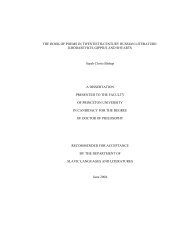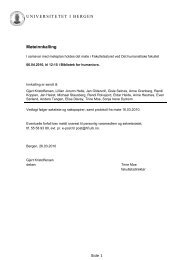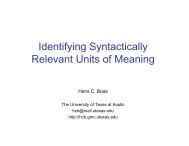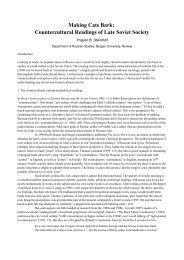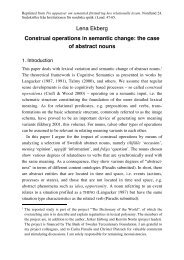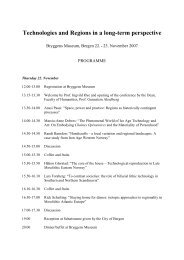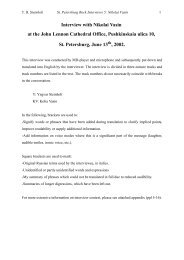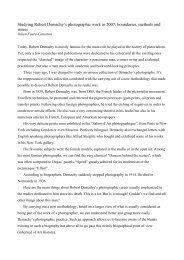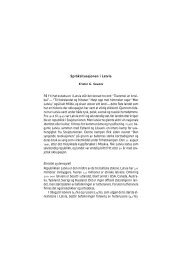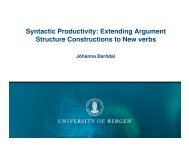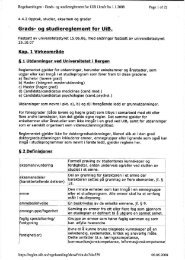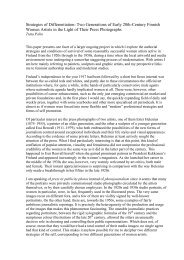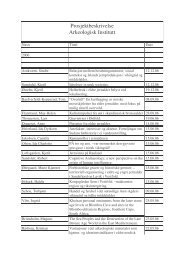Negative evidence and the raw frequency fallacy* - CiteSeerX
Negative evidence and the raw frequency fallacy* - CiteSeerX
Negative evidence and the raw frequency fallacy* - CiteSeerX
You also want an ePaper? Increase the reach of your titles
YUMPU automatically turns print PDFs into web optimized ePapers that Google loves.
76 A. Stefanowitsch<br />
gauntlet to local schools, saying ‘achieve your target increases in walking <strong>and</strong> cycling<br />
by summer 2005, <strong>and</strong> we will donate you a free, high quality children’s bike! (http://<br />
www.york.gov.uk/cgi-bin/wn_document.pl?type 5927).<br />
8. I do not want to conclude this note without applying <strong>the</strong> by now familiar reasoning<br />
to McEnery <strong>and</strong> Wilson’s question how <strong>the</strong> ungrammaticality of *He shines<br />
Tony books could be determined without intuition judgments. Shine (in all its<br />
senses) occurs 2,258 times in <strong>the</strong> BNC. On <strong>the</strong> assumptions made above, <strong>the</strong> expected<br />
<strong>frequency</strong> of shine with ditransitive complementation would be 30; <strong>the</strong><br />
observed <strong>frequency</strong> is zero. This difference is highly significant (p 6.47E14)<br />
even if we correct for multiple testing. Thus, without resorting to introspection,<br />
we have proved that [shine ditransitive] is significantly absent. Whe<strong>the</strong>r this is<br />
strictly due to ungrammaticality is doubtful: first, McEnery <strong>and</strong> Wilson’s sentence<br />
is interpretable (albeit weird); second, it is possible to find au<strong>the</strong>ntic ditransitive<br />
uses by certified native speakers of English for both senses of shine: (i) Shine me<br />
a light from your eyes dear (Christine McVie, Show me a Smile [performed by<br />
Fleetwood Mac]); (ii) He smiles telling him to shine him a metallic Purple armor<br />
(Jimi Hendrix, Bold as Love). Thus, we could hypothsize that ditransitive uses of<br />
shine are semantically so restricted that <strong>the</strong>y occur only in very specific circumstances<br />
(e. g., <strong>the</strong> ‘light’ reading can only occur ditransitively when <strong>the</strong> direct object<br />
is light) or that <strong>the</strong>y only occur in certain dialects (e. g., Lancashire [McVie]<br />
<strong>and</strong> Seattle [Hendrix]) or registers (e. g., rock lyrics).<br />
References<br />
Bonferroni Carlo E.<br />
1936 Teoria statistica delle classi e calcolo delle probabilità . Pubblicazioni del<br />
R Istituto Superiore di Scienze Economiche e Commerciali di Firenze 8,<br />
362.<br />
Chomsky, Noam<br />
1957 Syntactic Structures. The Hague: Mouton.<br />
1965 Aspects of <strong>the</strong> Theory of Syntax. Cambridge, MA: MIT Press.<br />
Gries, Stefan Th. <strong>and</strong> Anatol Stefanowitsch<br />
2004a Extending collostructional analysis: a corpus-based perspective on ‘alternations’.<br />
International Journal of Corpus Linguistics 9(1), 97129.<br />
2004b Co-varying collexemes in <strong>the</strong> into-causative. In: Achard, Michel <strong>and</strong> Suzanne<br />
Kemmer (eds.), Language, Culture, <strong>and</strong> Mind. Stanford: CSLI,<br />
225236.<br />
To appear Cluster analysis <strong>and</strong> <strong>the</strong> identification of collexeme classes. In John Newman<br />
<strong>and</strong> Sally Rice (eds.), Empirical <strong>and</strong> Experimental Methods in Cognitive/Functional<br />
Research. Stanford: CSLI.<br />
Leech, Geoffrey, Paul Rayson, <strong>and</strong> Andrew Wilson<br />
2001 Word Frequencies in Written <strong>and</strong> Spoken English: Based on <strong>the</strong> British<br />
National Corpus. London: Longman.<br />
McEnery, Tony, <strong>and</strong> Andrew Wilson<br />
2001 Corpus Linguistics. An Introduction. Second edition. Edinburgh: Edinburgh<br />
University Press.<br />
Nelson, Gerald, Sean Wallis <strong>and</strong> Bas Aarts (eds.)<br />
2002 Exploring Natural Language: Working with <strong>the</strong> British Component of <strong>the</strong><br />
International Corpus of English. Amsterdam <strong>and</strong> Philadelphia: John Benjamins.



